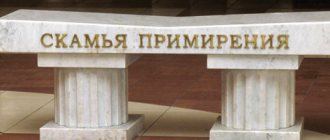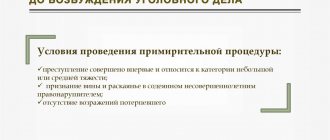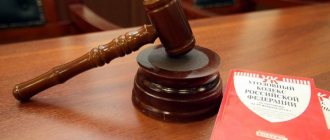Features of the appearance of a suspect
The decision to initiate a criminal case is made on the basis of the fact that a criminal offense has been committed or in relation to a specific person. If, when a case is initiated, there is sufficient information to suspect a specific person of committing a crime, the decision to open a criminal case is made in relation to this person. If a law enforcement officer doubts the involvement of a particular person in a case, he opens a case in connection with the crime committed.
When a case of a criminal offense is initiated, a person acquires the status of a suspect when he is detained on suspicion of carrying out illegal actions. Some people mistakenly assign this status to persons caught at the scene of an incident. Since at this moment the case has not yet been opened, according to legal norms, the person caught is not a suspect. His status is limited to the concept of “detainee”.
In this case, a person acquires the status of a suspect at the preliminary stage of the investigation, when a preventive measure is chosen against the detained person before he is charged under Article 100 of the Code of Criminal Procedure.
Legislation of the Russian Federation on a suspect
The Code of Criminal Procedure in Article 46 in its latest edition defines the categories of persons who are considered suspects under the Code of Criminal Procedure of the Russian Federation. These include:
- Persons against whom a criminal case has been initiated on the basis of suspicion of committing a crime, in compliance with the procedure established by Chapter 20 of the Code.
- Persons who were detained in accordance with Art. Art. 91, 92 of the Code, defining the procedure and grounds for detention.
- Persons in respect of whom a decision has been made to apply detention as a preventive measure pending the filing of formal charges, in compliance with the provisions of Article 100 of the Code.
- Persons who have been notified of suspicion of committing a criminal offense in compliance with the provisions of Article 223.1.
The list of grounds is closed, but can be supplemented with other concepts through the adoption of legislative acts and amendments to the provisions of criminal law.
Everything about criminal cases
Go to the text of the Code of Criminal Procedure
Url Additional information:
Suspect
- Clause 1 Part 1 46 Code of Criminal Procedure
suspect is a person against whom a case has been initiated
— clause 2, part 1, 46 Code of Criminal Procedure
suspect is a person who is detained
— clause 3, part 1, 46 Code of Criminal Procedure
suspect - to whom a preventive measure was applied (
100 Code of Criminal Procedure
)
- clause 4 part 1 46 Code of Criminal Procedure
suspect - a person notified of suspicion (
223.1 Code of Criminal Procedure
)
Suspect Detention
- Part 2 46 Code of Criminal Procedure
within 24 hours after arrest, interrogation is required
- Part 2 46 Code of Criminal Procedure
before the start of the interrogation, a meeting with a defense lawyer
- Part 3 46 Code of Criminal Procedure
right to one telephone conversation after arrest
- Part 4 46 Code of Criminal Procedure
suspect's rights:
Defender for the suspect
- clause 3, part 4 46 Code of Criminal Procedure
defense attorney for the suspect - from the moment the case is initiated
- clause 3, part 4 46 Code of Criminal Procedure
defense attorney for the suspect - from the moment of arrest
- clause 3, part 4 46 Code of Criminal Procedure
defense attorney for a suspect - from notification of suspicion
Copies of documents
- clause 1 part 4 46 Code of Criminal Procedure
has the right to know what is suspected of and to receive documents:
- clause 1 part 4 46 Code of Criminal Procedure
has the right to receive - a resolution to initiate
- clause 1 part 4 46 Code of Criminal Procedure
has the right to receive a detention report
- clause 1 part 4 46 Code of Criminal Procedure
has the right to receive a decision on a preventive measure
Testimony of the suspect
- clause 2, part 4 46 Code of Criminal Procedure
the suspect has the right to testify
- clause 2, part 4 46 Code of Criminal Procedure
the suspect has the right to refuse to testify
- clause 2, part 4 46 Code of Criminal Procedure
the suspect is warned about the use of evidence
Other rights of the suspect:
- clause 3.1 part 4 46 Code of Criminal Procedure
right to a notary
- clause 4, part 4 46 Code of Criminal Procedure
present evidence
- clause 5, part 4 46 Code of Criminal Procedure
file motions and challenges
— clause 6, part 4 46 Code of Criminal Procedure
explain yourself in your native language
- clause 7, part 4 46 Code of Criminal Procedure
right to a free translator
— clause 8, part 4, 46 Code of Criminal Procedure
get acquainted with the protocols
— clause 9, part 4 46 Code of Criminal Procedure
participate in investigative actions
- clause 10, part 4 46 Code of Criminal Procedure
make complaints
- clause 11 part 4 46 Code of Criminal Procedure
the right to defend oneself by all means
Article 46 of the Code of Criminal Procedure. Suspect
1) The suspect is the person:
Url Additional information:
- Part 4 146 Code of Criminal Procedure
the suspect is immediately notified of the initiation
1). or against whom a criminal case has been initiated on the grounds and in the manner established by Chapter 20 of the Criminal Procedure Code;
2). or who is detained in accordance with Article 91 of the Code of Criminal Procedure and 92 of the Code of Criminal Procedure;
3). or to whom a preventive measure has been applied before charges are filed in accordance with 100 of the Code of Criminal Procedure.
4). or who has been notified of suspicion of committing a crime in the manner established by 223.1 of the Code of Criminal Procedure;
Url Additional information:
RECEPTION protection
Reception against
Investigator's pressure: remarks during interrogation (
Part 4 166 of the Code of Criminal Procedure
)
2) A suspect detained in accordance with the procedure established by 91 Code of Criminal Procedure must be interrogated no later than 24 hours from the moment of his actual detention.
Url Additional information:
- Part 2 46 Code of Criminal Procedure
meeting with a defense lawyer before the interrogation of the suspect
- clause 9, part 4 47 Code of Criminal Procedure
the right of the accused to have confidential meetings with a defense lawyer
- Part 4 92 Code of Criminal Procedure
meeting with a defense lawyer before the first interrogation of the suspect
- clause 4, part 2 389.17 Code of Criminal Procedure
violation of the right to have the assistance of a defense lawyer
- Art. No. 103-FZ visits with a defense lawyer in a pre-trial detention center
- paragraph 16
Plenum No. 29 meeting with a lawyer via video conferencing
The right to see a defense lawyer
Dating with a protector
, violation of the rights of the accused to defense (
clause 9, part 4, 47 of the Code of Criminal Procedure
)
Before the start of the interrogation, the suspect, at his request, is provided with a private and confidential meeting with a defense lawyer.
Url Additional information:
Right to call
- Part 1 96 Code of Criminal Procedure
right to a telephone call after arrest (3 hours)
- Art. No. 103-FZ notification of relatives about the place of detention
Phone call
Phone call
relatives from the detainee (
Part 1 96 of the Code of Criminal Procedure
)
3) In the case provided for in paragraph 2, part 1 of this article, the suspect is given the right:
- for one telephone conversation in Russian in the presence of an interrogating officer, investigator in order to notify close relatives, other relatives or
close persons about their detention and location,
Url Additional information:
- Part 1 96 Code of Criminal Procedure
notification of relatives about the arrest (instead of calling)
- and the inquiry officer, the investigator must fulfill the duties of notifying the arrest in accordance with Article 96 of the Code of Criminal Procedure.
4) The suspect has the right:
1). know what he is suspected of and get:
Url Additional information:
- Part 4 146 Code of Criminal Procedure
the applicant and the suspect are notified of the initiation of the case
Copies of the resolution
Copies of the resolution
sent to the victim and suspect
- a copy of the decision to initiate (against him -
approx.
the phrase is excluded by Federal Law No. 205-FZ of July 19, 2018) in a criminal case,
or a copy of the arrest report,
- or a copy of the decision to apply a preventive measure against him;
2). give explanations and testimony regarding suspicions against him;
Url Additional information:
- Part 1 51
Constitution of the Russian Federation witness immunity
- paragraph 29
Plenum No. 9, refusal to testify cannot be assessed negatively
or refuse to give explanations and testimony.
Url Additional information:
- Clause 1 Part 1 276 Code of Criminal Procedure
contradictions in testimony early testimony is made public
If the suspect agrees to testify, he must be warned that his testimony
may be used as evidence in a criminal case,
Url Additional information:
- Clause 1 Part 1 276 Code of Criminal Procedure
contradictions in testimony early testimony is made public
— clause 11
Plenum No. 55 checks all the defendant’s testimony (old and new)
- including in the event of his subsequent refusal of this testimony, with the exception of the case provided for in paragraph 1 of Part 2 of 75 of the Code of Criminal Procedure;
3). use the assistance of a defense lawyer from the moment provided for in paragraphs:
- clause 2, part 3 of 49 Code of Criminal Procedure (from the moment the case was initiated),
Url Additional information:
- Part 4 92 Code of Criminal Procedure
meeting with a defense lawyer before the first interrogation of the suspect
- Art. No. 103-FZ visits with a defense lawyer in a pre-trial detention center
- paragraph 16
Plenum No. 29 meeting with a lawyer via video conferencing
- clause 4, part 2 389.17 Code of Criminal Procedure
violation of the right to have the assistance of a defense lawyer
- clause 3, part 3 of 49 Code of Criminal Procedure (from the moment of arrest),
- clause 3.1 part 3 49 of the Code of Criminal Procedure (from the moment of notification of suspicion),
Url Additional information:
- Part 4 92 Code of Criminal Procedure
meeting with a defense lawyer before the first interrogation
and have a meeting with him alone and confidentially before the first interrogation of the suspect;
Url Additional information:
- Art. No. 103-FZ the right to a meeting with a notary
— clause 145.1
Rules of the pre-trial detention center for a meeting with a notary
3.1).
from the moment of choosing a preventive measure in the form of detention or house arrest, have meetings without limiting their number and duration with a notary in order to certify the power of attorney for the right to represent the interests of the suspect in the field of business activity.
At the same time, it is prohibited to perform notarial acts in relation to property, cash and other valuables that may be seized. Url Additional information:
- Part 2 86 Code of Criminal Procedure
suspect's right to collect evidence
- Part 2.2 159 Code of Criminal Procedure
evidence cannot be refused
4).
present evidence;
Url Additional information:
- Part 2 159 Code of Criminal Procedure
a request for investigative actions cannot be refused
5).
submit applications
Url Additional information:
SITUATIONS from practice
Prosecutors substituted
each other, the right to challenges may be violated
and file challenges;
Url Additional information:
— Part 2 18 Code of Criminal Procedure
the right to act in one's native language
6). give evidence and explanations in his native language or a language he speaks;
Url Additional information:
— Part 2 18 Code of Criminal Procedure
right to a free translator
7). use the help of a translator for free;
Url Additional information:
- Part 6 166 Code of Criminal Procedure
The protocol is presented for review to all participants
8). get acquainted with the protocols of investigative actions carried out with his participation and submit comments on them;
9). participate, with the permission of the investigator or inquiry officer, in investigative actions carried out at his request, the request of his defense attorney or legal representative;
Url Additional information:
— 124 Code of Criminal Procedure
complaint to the prosecutor, head of the investigative body
— 125 Code of Criminal Procedure
appeal to the court at the preliminary investigation stage
10). file complaints against actions (inaction) and decisions of the court, prosecutor, investigator and interrogating officer;
Url Additional information:
— clause 2
Plenum No. 29 the right to defend oneself by any legal means
Two different rights
Right to defense
- these are two different rights (to self-defense and to the assistance of a defender)
eleven). defend yourself by other means and methods not prohibited by the Criminal Procedure Code.
Return to the text of the Code of Criminal Procedure
Seek advice
Cases of establishing a daily period for interrogation
In relation to a detained suspect, the maximum period for official interrogation by the investigator is twenty-four hours from the moment of detention, if the basis for his detention, in accordance with Article 91 of the Code, is:
- Detection of a person at the time of the commission of a crime or immediately after the commission of a criminal offense.
- Identification of a person as having committed a criminal offense by victims or eyewitnesses.
- Detection of obvious traces of a crime on the suspect (with him), on his clothing or at his place of residence.
The list of grounds for detention is open, as it may include other grounds suggesting that the suspect may flee before formal charges are filed.
Specifics of acquiring status
Art. 46 of the Code of Criminal Procedure of the Russian Federation has significantly expanded the grounds for involving a citizen in proceedings. The status in question is received not only by a detained subject or a person to whom one of the preventive measures has been applied before charges are filed. A suspect is a citizen against whom a criminal case has been initiated. Its initiation is directly stated in Article 318 of the Code, as well as in Art. 448. Meanwhile, for other categories of cases, the resolution may contain information about the subject suspected of the crime. Taking into account that from the moment the proceedings are opened, a citizen acquires almost the entire range of legal opportunities, it seems that the prosecutor or other authorized person in the primary materials is obliged to indicate known information about him (if it was received). If at the time of initiation of the case there is no information about the subject, but subsequently (during the preliminary investigation) it appears, then the person who is actually considered involved in the crime does not acquire the status provided for in Art. 46 of the Code of Criminal Procedure of the Russian Federation. In a procedural sense, he remains uninvolved in the proceedings until his arrest. When conducting an inquiry, the situation is somewhat different. If in the process of its production information was obtained that is sufficient to conclude that a person may be involved in the act, the authorized employee draws up a written notice. A copy of it is handed over to the relevant person with an explanation of the legal possibilities enshrined in Art. 46 Code of Criminal Procedure.
Groups of general rights for all persons
Ensuring the rights of suspects rests with law enforcement officials who are prosecuting them. In this regard, they must ensure the implementation of the following capabilities:
- rights relating to all persons participating in criminal proceedings (awareness of rights, duties and responsibilities; the opportunity to testify, complain, petition, declare something; use the free assistance of a linguist-translator; attach written materials to the case; make a statement regarding participants in the process of recusal);
- the rights of a person participating in investigative actions (to be notified of the use of technical means in investigative actions and to become familiar with the protocols; to clarify and supplement the content of the protocols; to check the accuracy of the recorded testimony; to refuse to sign the protocols with an explanation of the reasons);
- rights relating to both the suspect and the accused (protect rights; the right of the suspect/accused to be protected by a lawyer; a minor to have a representative under the law; rely on protection from the state; meet with a lawyer in private; get acquainted with the results of the examination, challenge it and otherwise participate in its implementation; study relevant documents and completed forms).
General rights groups for suspect only
Guarantees of the rights of the suspect must be ensured by the interrogating officer or investigator.
These rights include the following:
- rights related only to the suspect (to use the services of a defense lawyer; not to testify against close people and family members; to use one’s written notes; to study one’s testimony and protocols of interrogations and confrontations; to participate in investigative activities);
- the rights of those in custody (enshrined in the Constitution of the Russian Federation, including the right to protection and adequate treatment, as well as to the implementation and execution of transactions and transfers of funds, etc.).
Providing the suspect and accused with the right to defense and use of their own records is implemented by investigators and other persons participating in the proceedings.
These rights allow the person against whom a criminal case has been or will be initiated to be aware of all the activities and actions being carried out in relation to him, and also to a certain extent to control the actions being taken.
Additionally
A citizen is given the status of a suspect for a limited period of time. If a person was detained and then taken into custody, then the corresponding period cannot be more than 10 days from the moment of actual capture (restriction of freedom) until specific charges are filed. If no preventive measure is chosen within 48 hours, the person must be released. Formally, after this, the citizen cannot be considered a suspect. An exception is the case when the decision on the commencement of proceedings will reasonably contain information about it. As part of the investigation, a citizen will be considered a suspect until an indictment is filed against him.
Primary rights after detention
After arrest, the rights of a suspect under the Code of Criminal Procedure of the Russian Federation include the right, before the expiration of a three-hour period, to have one telephone conversation in a language understandable to the investigator or interrogating officer (Russian). The suspect is allowed to notify his next of kin or other loved ones about the fact of his arrest and his place of stay.
The investigator or inquiry officer, in turn, must make a note in the arrest report. If the suspect waived the right to make a telephone call or was unable to make it on his own due to mental or physical disabilities, the next of kin and other loved ones are notified by the investigator or interrogating officer.
List of persons subject to notification
Within twelve hours from the arrest, the investigator is obliged to notify the following persons about the arrest of the suspect:
- If the suspect is a military personnel, the command of his unit is notified.
- If the suspect is an internal affairs officer, his superior is notified.
- If the suspect is a member of a public monitoring commission, the secretary of the Civic Chamber of the Russian Federation and the corresponding public monitoring commission are notified.
- If the suspect is a lawyer, the Chamber of Lawyers is notified.
- If the suspect is a subject or citizen of a foreign state, the consulate or embassy of that state is notified.
This list is closed and can only be supplemented by amending the relevant acts.
Rights regarding documents
In addition to the right to make a telephone call on the first day, according to part four of Article 46 of the Code of Criminal Procedure, it is possible to exercise other rights that the suspect has under the law. The Code of Criminal Procedure provides for the following rights:
- the right to know about suspicions against him;
- the right to receive a resolution (copy) to initiate a criminal case;
- the right to receive copies of other procedural documents (detention protocol; resolution indicating the use of a preventive measure).
The right to information about what exactly is suspected of
This is perhaps the most important and dominant right of the suspect. Having acquired just such a status, a person has the right to know what exactly he is suspected of. Timely notification is the responsibility of the person conducting the preliminary investigation. There are several ways to implement this:
- providing the person with a copy (duly certified) of the decision to initiate a criminal case against him, which reflects the grounds and reasons for making this decision, as well as the norms of criminal law on the basis of which this was made;
- indication of the motives and grounds for detention in the arrest report;
- an indication in the resolution of the application of a certain preventive measure against a person before he is formally charged with a crime of which he is suspected.
It should be borne in mind that the suspect has the right (Article 46) to receive copies of the above documents (resolution, protocol). Moreover, the delivery of documents must be carried out within 24 hours from the moment they are issued or executed.
Rights regarding interaction with investigators and defense counsel
When interacting with other persons, the suspect has the following rights:
- The right to testify and explain what he is accused of, or to report a refusal to testify or explain. If the suspect agrees to give evidence or make a statement, he is warned about the possibility of using it as evidence in a criminal case and during criminal proceedings, even if he subsequently refuses it. If the testimony is given in the absence of the defendant's defense attorney, it cannot be used at the trial.
- The right to receive assistance from a public or private defender from the moment a criminal case is initiated, from the moment of arrest or delivery of a notice of recognition of a person as a suspect.
- The right to confidential communication with a defense lawyer.
- If a suspect is engaged in business activities, he has the right to freely communicate with a notary representing his interests in business.
Right to testify or refuse to testify
The law grants a person suspected of committing a criminal act the right to testify and explain the suspicions against him. He can also refuse this action. In the first case, the person is warned that all of his testimony can be used as evidence in a criminal case in the future, even if he refuses it. However, there is an exception. If the suspect refuses his testimony, and a defense lawyer was not present at the moment when it was given, the Code of Criminal Procedure does not count it in court.
As mentioned above, this is a person’s right, but not his obligation. The suspect bears absolutely no responsibility for false information or refusal to testify. The legislator considered that this approach would be the most optimal. Responsibility for false testimony can push a person to self-incrimination according to the long-known principle: “You must choose the lesser of two evils.”
"Judicial" rights
The rights of a suspect in criminal proceedings, exercised in court, include the following:
- Right to present evidence.
- The right to file motions and challenges.
- The right to testify in one’s native language or in Russian.
- The right to free assistance from an interpreter.
- The right to familiarize himself with the protocols of the investigative measures carried out and the actions in which he participated, and to express comments on them.
- The right to participate in investigative actions with the consent of the inquiry officer or investigator, which are carried out at the request of the accused himself or his representative.
- The right to appeal decisions and actions (or inaction) of the investigator, head of the department or head of the inquiry, prosecutor, investigator or court.
- The right to use other means and methods of protection that are not prohibited by law.
The list is closed and can only be supplemented by amending the relevant acts.
Among all groups of rights, the most important is the right to defend oneself and ensuring the suspect the right to protection from the investigation.
Who is the accused?
The procedural status of the accused is defined in Article 47 of the Code of Criminal Procedure. According to paragraph 1, the law calls the accused the one against whom the following decisions were made:
- resolution on engagement in such capacity;
- indictment;
- indictment.
All of the above are procedural grounds to consider a person guilty. But this understanding of the accused, as in the case of the suspect, is formal. The Constitutional Court, with an eye to the opinion of the European Court of Human Rights, says that the concept should be interpreted more broadly than specified in the Code of Criminal Procedure. This is necessary so that any person against whom actions of an incriminating (accusatory) nature are committed can receive the right to defense in a timely manner.
None of the documents listed above can be issued just like that; there must be a compelling reason - namely, the totality of evidence of the suspect’s guilt.
The accused has this status until a trial is scheduled against him. From now on, he will be called “defendant.” If the verdict is guilty, the status will change to “convicted”; if the verdict is acquittal, the status will change to “acquitted”.
Procedural rights of the accused
The set of procedural rights vested in the accused is set out in paragraph 4 of Article 47 of the Code of Criminal Procedure. It includes all the rights that the suspect has, as well as a number of others that only the accused can use (since his situation is more serious):
- familiarization with the resolution on the appointment of a forensic examination and its conclusion, as well as posing questions for the expert;
- familiarization with any materials of the criminal case and extracts from them in any volume, but only after the completion of the preliminary investigation - you can make copies, but at your own expense;
- an objection to the termination of a criminal case on a number of grounds determined by the Code of Criminal Procedure - for example, you can refuse an act of amnesty;
- taking an active part in the trial at first instance, appeal, cassation, supervision;
- familiarization with the protocol and audio recording of the court session with the submission of comments regarding their content;
- appealing judicial acts and obtaining copies thereof;
- receiving copies of complaints and presentations on the case with filing objections to them;
- taking part in the consideration of issues related to the execution of the sentence.
Neither the accused nor the suspect needs to look for all this in the Criminal Procedure Code - the interrogator, investigator, judge must explain to them their rights. Moreover, to explain is not only to declare, but also to give explanations if something is not clear to the accused (suspect).
Status of a suspect from the point of view of legal scholars
Scientific consultants constantly publish new comments on the Code of Criminal Procedure. Article 46 of the Code of Criminal Procedure of the Russian Federation is a model of immediate action if a suspect appears in a criminal trial.
From the moment a suspect appears in a criminal case, criminal prosecution begins actively and the main indictment version is developed. Carrying out this work means the beginning of the emergence of legal relations between an official authorized by the state, an official and a suspect of committing a specific criminal offense. The investigator or inquiry officer proves the guilt of the suspect, and he, in turn, defends himself from suspicion.
From the moment an authorized person decides to initiate a case and begin criminal prosecution of a person, which will significantly affect his rights and freedoms, the person is officially considered a suspect.
Gaps in legislation
Art. 46 of the Code of Criminal Procedure of the Russian Federation (as amended) establishes the rule on the immediate interrogation of a citizen. This requirement is related to the need to ensure the implementation of legal opportunities established by law. In particular, we are talking about the right to defense. It allows a citizen to immediately rebut an accusation by giving truthful testimony. When implementing this rule, the position of persons who received the status of suspects directly by the very act of initiating a case is somewhat uncertain. The legislation does not resolve the issue regarding the time during which a person may not be aware that law enforcement agencies have doubts about his innocence in a crime, when he can be questioned. Simply put, it is unclear within what time frame he has the right to carry out his defense. The provision that a subject in the status under consideration appears in proceedings from the moment of its initiation can also be considered flawed. After all, in fact, there is not and cannot even be any evidence in the case.
Circumstances of change in suspect status
A citizen ceases to be a suspect when one of the following circumstances occurs:
- An act or indictment has been issued against the suspect, according to which he becomes an accused.
- The criminal case is dismissed.
- Criminal prosecution is terminated.
- The detainee was released. No preventive measure is applied to him, and he is not notified that he is a suspect.
- The preventive measure taken against the suspect was cancelled.
When one of the above facts occurs, a person can become either free or accused, depending on the circumstances.
The commented article reveals the rights of the suspect, but not in full. The full picture can be revealed through a comprehensive consideration of the provisions of criminal procedure legislation.
Responsibilities of the suspect
- Appear before the inquirer, investigator and the court within the time prescribed by these persons, or notify in advance of valid reasons for the impossibility of attendance.
- Comply with the rules of conduct in accordance with the preventive measure applied to him.
- When taking a suspect into custody, he is obliged to comply with legal requirements put forward by the administration of the institution and observe the appropriate order at the place of location.
- Agree to an examination, personal search, submitting samples for research, receiving medical care, conducting examinations, etc.
Failure to fulfill at least one of these obligations entails possible criminal prosecution. These include:
- Obligation to appear.
- Temporary removal from office.
- Drive unit.
- Seizure of property.
The list of measures may be supplemented depending on the circumstances.
Many complaints are received regarding violations of the rights and obligations of persons suspected of committing criminal offenses. In most cases, this is due to the negligent attitude of the inquiry and investigation staff during the criminal prosecution. Therefore, complaints filed by suspects and their representatives are considered with special care to prevent violations of their rights in the future.











